Brown Collection: I. Courting Songs
I. COURTING SONGS CONTENTS
1. A Paper of Pins
2. Madam, Will You Walk?
3. The Courting Cage
4. Madam Mozelle, I've Come Courting
5. Miss, Will You Have a Farmer's Son?
6. Lucindy, Won't You Marry Me?
7. Soldier, Soldier, Won't You Marry Me?
8. The Quaker's Wooing
9. The Old Man's Courtship
10. When I Was a Young Girl
11. Where Are You Going, My Pretty Maid?
12. Madam, I Have Gold and Silver
13. One Morning in May
14. No, Sir
15. Courting Song
16. Don't Stay after Ten
17. I Wouldn't Marry
18. A Single Life
19. When I Was Single
COURTING SONGS
AMONG the oldest and most widely diffused of traditional songs are the dialogues of courtship. Theocritus knew them in Sicily, and Vergil probably heard them by the Alincio. In English, 'A Paper of Pins' is known, doubtless, all over the English-speaking world. With two exceptions, our North Carolina texts, like most other versions found in this country, end satirically; when the lady accepts the last of the wooer's offers, the key of his chest, he declares that all she wants is money and retracts his offer. There are several variations on this theme. In two of them, here given as the two texts of 'The Courting Cage,' the wooer is refused despite all his fine possessions because he is a drunkard or a card-player or both.
Quite different is 'Miss, Will You Have a Farmer's Son?' Here a girl is offered five suitors in succession and refuses all but two, a California boy and a Southern lad. One supposes that this song dates from some time in the sixth or seventh decade of the last cetury. Then there are songs of courtship that are entirely humorous or satirical. The best of these, 'The Old Man's Courtship' and 'The Quaker's Wooing,' are English but are well remembered on this side of the water. 'When I Was a Young Girl,' with its catchy 'this-a-way that-a-way' refrain, is a singing game of children in the old country but has become social satire here: after going this-a-way, that-a-way to her husband's funeral she practices a different this-a-way that-a-way to catch his successor.
'Soldier, Soldier, Won't You Marry Me?' is a game song of children in England but seems in this country to be merely a comic song. Another English song, of the pastourelle type of wayside seduction, in which the girl tells her wooer that she will have him "or almost anybody," has not often been recorded in America. In 'Madam, I Have Gold and Silver' a familiar courting dialogue is turned at the end, rather surprisingly, into a returned-lover story. 'One Morning in May,' better known as 'Tlie Nightingale,' is a favorite with American ballad singers.
A curious custom is reflected in two pieces, 'Courting Song' and 'Don't Stay after Ten.' In connection with the former of these Mrs. Sutton gives an anmsing account of the custom from personal experience. She was engaged at the time as inspector of schools and had got as far as the Watauga River at the foot of Beech Mountain near the Tennessee line: in fact, the school district wliich she then visiting; was partly in Avery and Watauga counties and partly in Tennessee. She went home with the teacher to spend the night.
Her home was a long, low, old-time-looking house with three front doors all opening on a long porch. It was early in the fall and still warm weather. We didn't get to the house till dusk, as we had talked over her work for two hours after school, and she helped get supper while I sat on the porch and watched the stars come out over the wall of the mountain. . . . While she helped her mother cook supper she sang this song, and I asked her to copy it out for me.
After supper she suggested that I retire. I wasn't at all sleepy and it was only seven o'clock, but she insisted that I must retire and urged me so much that there was no way out of it. I went.
The room in which I slept was the one on the upper end of the long porch. It was a long room with two beds at the back, a fireplace in front, an organ in one of the front corners and a washstand with a red flowered bowl and pitcher in the other. There were several enlarged portraits in gilt frames on the walls, and all of the chairs had hand-embroidered throws on them. I undressed and got into one of the high feather beds. Miss Martha folded my clothes carefully, slid my traveling bag under the bed, and took a comb, brush, and some powder out of an opening in the front of the organ and brushed her pretty hair, powdered her face, and went to the door and let in her "fellow." who had come courting. I was the only one of the three people in the room who was the least bit embarrassed, and I might have saved myself the trouble. The caller ignored me as completely as though I had been a thousand miles away and addressed himself to the business of courting as energetically as if he and his lady-love were on a desert island.
He was like the hero of this ballad in only one particular. I am sure he stayed all night. I tried not to listen the first three or four hours: then I tried to hear the whispered remarks and to observe the technique of "settin' up" on that side of the ridge: but at last nature rebelled and I went to sleep. Some time in the wee sma' hours my hostess came to bed with me. From that day to this she has never mentioned the episode nor have I. It isn't good manners to tease a girl about courting unless you know her well, and any remark about the call on my part would have been interpreted as "dragging" her.
With these two songs sliould he compared certain songs in the section on regional and social satire — 'If You Want to Go A-Couting,' 'When Young Men Go Courting,' 'Johnson Boys,' and 'The Carolina Crew.'
In the same general category belong two other songs or groups of songs, the 'I Wouldn't Marry' group and the "When I Was Single' group. In the "I Wouldn't Marry' group sometimes the man speaks, declaring that he wouldn't marry an old maid, or a rich gal, or a poor gal, or a city gal, generally for nonsensical reasons; sonietitnes a woman speaks, declaring that she wouldn't marry any one of a string of characters she describes not so nonsensically as in the preceding set, but is determined to die an old maid. Some are devoted entirely to the contrast between crabbed age and youth; she will not marry an old man but would gladly marry a young man with an apple in his hand.
There are four texts of a song in which a girl rejects all other sorts of suitors but will gladly marry a farmer boy; she loves to wash the dishes, sweep the floor, feed the chickens, and milk the cows. And in two songs the woman and the man speak alternately. The songs in this group look as if they might be play-party or dance songs, but they are not so described by the contributors. The 'When I Was Single' theme also appears in two forms, one for man and one for woman. The former is found many times in the Collection but without much variation; when he was single his pockets would jingle; when his wife died he laughed till he cried; but he had no more sense than to marry a second time, this time to a woman he describes as the devil's grandmother. The woman's form, in which she complains of the misery of being married to a drunkard or a gambler or both, is given in the following section, the songs about drink and gambling.
1. A Paper of Pins
For the history and spread of this courting dialogue, see BSM 507. To the references there given should now be added Virginia (FSV 229-31), West Virginia (SFLQ vi 226-31; one of these is the 'Keys of Canterbury' form, not otherwise known from the United States), Missouri (OFS in 40-5), Ohio (BSO 120-5), Illinois (SFLQ vi 224-6). In one of these it appears as a singing game. Mrs. Steely found it as a play-party song in the Ebenezer community in Wake county. All but two of our North Carolina texts have the misogynist ending familiar in American versions, but the last two end romantically with "the key of my heart."
[Music From Brown Vol. 5: A. Clarice Burleson Avery County 1940]
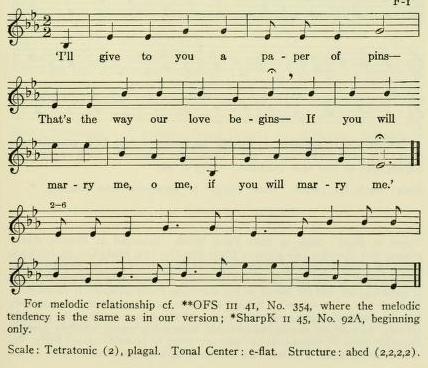
A. 'The Paper of Pins.' Reported by Allie Ann Pearce of Colerain, Bertie county. Not dated.
1. 'Miss, I'll give you a paper of pins —
This is the way our love begins —
If you will marry me. Miss, if you will marry me.'
2. 'I'll not accept the paper of pins,
If this is the way our love begins;
I'll not marry you, I'll not marry you.'
3. 'Miss, I'll give you a little pet dog,
To set on your lap when you go abroad.
If you will marry me. Miss, if you will marry me.'
4. 'I'll not accept the little lap dog
To set on my lap when I go abroad;
I'll not marry you, I'll not marry you.'
5. 'Miss, I'll give you a dress of red
Stitched all around with golden thread.
If you will marry me. if you will marry me.'
6. "I'll not accept the dress of red
Stitched all around with golden thread;
I'll not marry you, I'll not marry you.'
7. 'Miss, I'll give you a dress of green
And you may dress as fine as any queen,
If you will marry me, Miss, if you will marry me.'
8. 'I'll not accept the dress of green
It I may dress of* any queen;
I'll not marry you. Sir, I'll not marry you.'
9. 'I'll give to you the key to my heart,
We may lock it to never part;
If you will marry me, if you will marry me.'
10. 'I'll not accept the key to your heart,
If we may lock it to never part;
I'll not marry you. Sir, I'll not marry you.'
11. "Miss, I'll give to you the key to my chest,
You may have money to your request,
If you will marry me. Miss, if you will marry me.'
12. 'I'll accept the key to your chest
If I may have money to my request;
I'll marry you. sir. I'll marry you.'
13. 'Ha, ha, ha! If money is all
I'll not marry you at all;
I'll not marry you, Miss, I'll not marry you.'
*Miswritten, one supposes, for "like."
B. 'Paper of Pins.' Reported by Sarah K. Watkins from Anson and Stanly counties. The series here is paper of pins, dress of red, dress of blue, coach of eight, coach of four, key of my heart, key of my desk, and it ends like A.
C. 'The Paper of Pins.' Reported by Louise Bennett of Middleburg, Vance county. Not dated. The series is paper of pins, coach and four, coach and six, the key to my heart, the key to my bank; and it ends:
'Ah, ha, ha! Money is all!
A woman's love is nothing at all!
And I'll not marry you, you. you,
And I'll not marry you.'
D. 'Paper of Pins.' Reported by Mabel Ballentine of Wake county. Not dated. The series here is paper of pins, coach of four, coach of six, key to my heart, key to my desk, and the conclusion as in preceding texts.
E. 'A Paper of Pins.' From Ethel Brown of Catawba county. Not dated. The series is paper of pins, little lap dog, dress of green, keys of my heart, keys of my trunk ("To promise you I'll never get drunk"), keys of my desk; and it ends:
'So you do love money and you don't love me,
And since you love money you can't marry me.
And I won't marry you, you, you,
And I won't marry you.'
F. 'Paper of Pins.' Contributed by Floy Leach of Cary, Wake county, in 1927. Despite its title it has no paper of pins; the series runs: dress of green, little pet dog, key of my heart, key of my desk, and the customary final stanza.
G. 'Paper of Pins.' This text is anonymous but no doubt authentic. The series is paper of pins, dress of red, dress of blue, diamond ring, match of gray, match of six (the "match" seems to mean a team of matched
horses), key to my heart, key to my chest; and the text ends:
'Ha! ha! ha! money is all,
Woman's love is nothing at all.
And I'll not marry you, miss,
And I'll not marry you.'
'Oh, pray. sir. don't take it so;
It's all a joke I'll let you know;
I'll not marry you, sir,
And I'll not marry you.'
H. 'Paper of Pins.' From Miss Pearl Webb of Pineola, Avery county. This text is accompanied by the tune. The series is little dog. dress of green, coach of six, dress of red, key of my heart, key of my desk,
and the final "money is all."
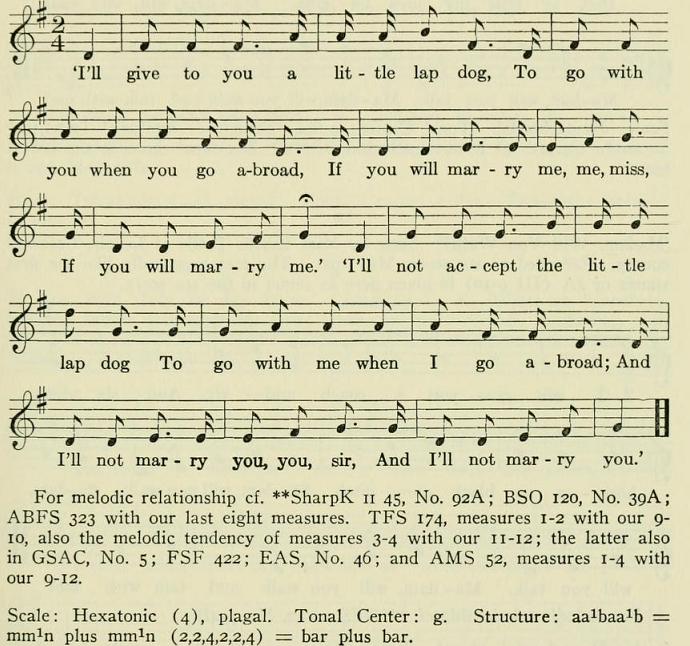
I. 'Paper of Pins.' Reported by R. D. Ware of Allemarle, Stanly county, in 1921, as obtained from Mrs. Harrison Gregory of North Wilkesboro, Wilkes county. The series here is paper of pins, little lap dog, dress of green, dress of red, keys to my heart, keys to my desk; and it ends:
'It's now, my friends, as you can see,
She wants my money but don't want me.
But I won't many you, ma'am,
No. I won't marry you.'
J. 'Paper of Pins." Reported by Katherine Bernard Jones of Raleigh. Only a fragment: the paper of pins and the key to my desk.
K. 'Paper of Pins.' From Ethel Hicks Buffalo of Granville county. A fragment; the first two stanzas only.
L. 'Paper of Pins.' Obtained from B. N. White, time and place not recorded. The series runs: paper of pins, dress of red, the key to my chest. key to my heart, and ends:
"I will accept the key to your heart
[*In token that we shall never part.]
And I will marry you, you, you,
And I will marry you.'
*The second line is missing in the manuscript but may be supplied with certainty.
M. 'Paper of Pins.' From Miss Amy Henderson of Worry, Burke county, in 1914. Like L, this ends on the romantic note; the series runs: paper of pins, little lap dog, dress of red, dress of green, coach and four, coach and six, key to my chest, key to my heart.
2. Madam, Will You Walk?
This is a less familiar form of the 'Paper of Pins' courting dialogue. It is known in Somerset (JFSS 11 87-8), but I have not found it reported from America. Mrs. Sutton's text is strongly influenced by the customary 'Paper of Pins' series, and so is Miss Tuttle's as far as it goes.
'Madam, Will You Walk?' Reported by Mrs. Sutton, but she does not say when and where she heard it.

.jpg)
1. 'I will give you a paper of pins,
For that's the way true love begins.
If you will walk, if you will talk,
If you will walk and talk with me.
2. 'I will give you a coach and six
And every horse as black as pitch.
Madam, will you walk, madam, will you talk,
Madam, will you walk and talk with me?'
3. 'I will give you a coach and four
And every horse as white as snow
If you will walk, if you will talk.
If you will walk and talk with me.'
4. 'I will give you the keys to my heart,
That we may lock it never to part.
Madam, will you walk, madam, will you talk,
Madam, will you walk and talk with me?'
5. 'No, I will not walk, no, I will not talk,
No, I will not walk and talk with you.'
6. 'I will give you the keys of my chest,
That you may have money at your request,
If you will walk, if you will talk,
If you will walk and talk with me.'
7. 'I will accept the keys of your chest,
That I may have money at my request;
Yes, I will walk, yes, I will talk,
Yes, I will walk and talk with you.'
8. 'You will accept the keys of my chest
That you may have money at your request!
But I will not walk, I will not talk,
I will not walk and talk with you.'
B. 'Madam, Will You Walk?' From Miss Emeth Tuttle of Lenoir. Caldwell county, in May 1921. With the air. Only one stanza of the text, which is the same as stanza 2 of A.
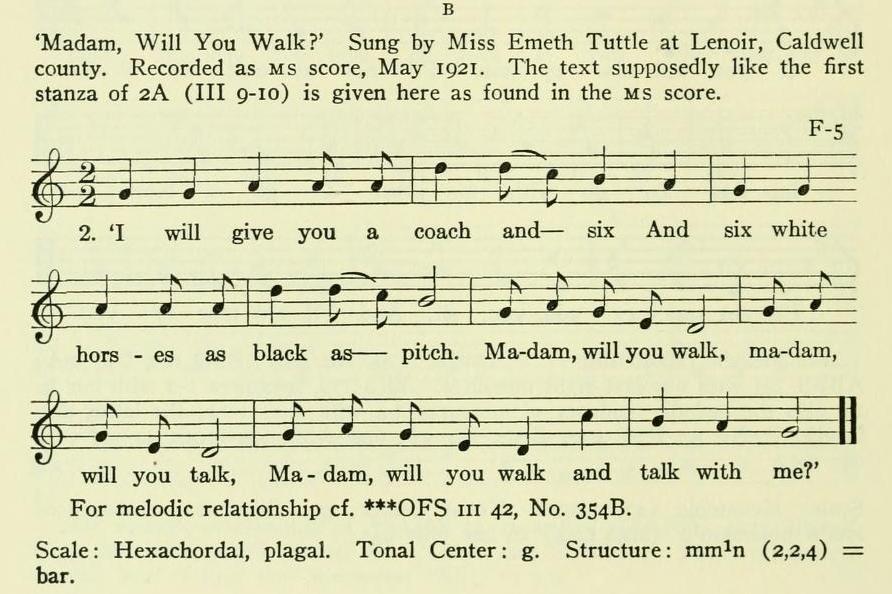
3. The Courting Cage
So called in the Ozarks, according to Vance Randolph (OASPS 216-19), though he confesses that he does not know what a courting cage is (in OFS iii 361-3. where he gives a Missouri version, he suggests that it is a corruption of "court engaged"). In Virginia it is called 'The Courting Case' (SharpK 11 249-51) or 'Kind Sir' (SCSM 305-6) or 'The Drunkard's Courtship' (FSV 232-4). Chappell calls his North Carolina version (FSRA 199-200) 'The Drunkard's Courtship.' It has heen found also in Mississippi (FSM 168-9), Indiana (SFLQ v 182-3). and Michigan (BSSM 417-19).
A. 'Kind Sir, I See You've Come Again.' Taken from Miss Jewel Robhins of Pekin, Montgomery county, in 1922.


1. "Kind Sir, I see you've come again,
Pray tell me what it's for.
For when we parted on yonders hill
I told you to come no more, more, more,
I told you to come no more."
(repeat thus the last line of each stanza)
2. 'Oh, Miss, I fall down at your feet,
Your mercy I implore;
If one to me he granted not
I'm lost for evermore.'
3. 'Oh, Sir, I know just what you want;
You want to take me in.
And if I will agree to marry you
You'll drink and gamble again.'
4. 'Oh, Miss, it's a thing I never did do
And I never did think 'twas right.
If you'll agree to marry me
I'll never lie out one night.'
5. 'Oh, Sir, I think you're might bold
To make that over again;
For do you think I'm simple enough
To marry a barrel o' gin?
6. 'Kind Sir, I think you'd hetter go,
Your staying here is vain;
You're only troubling me very much
And giving yourself great pain.'
7. 'Oh, Miss, I have a very fine horse —
He paces like the tide —
That you may have at your command
Whenever you choose to ride.'
8. 'Oh, sir, I know your very line horse;
He paces like a tide.
I know his master loves to drink,
And I can't he his bride.'
9. 'Oh, miss, I have a very fine house
And also very fine yards.'
'But who will stay with me at night
When you are playing cards?'
10. 'Oh, miss. I have a very fine orchard
And also very fine fruit
That you can have at your command
If you will he my bride.'
11. 'Oh, sir, I know your very fine orchard
And also very fine fruit;
But when I come in and turn you out
You know a hog- will root.'
12 'Oh, miss, you are a hard old jade
And very hard to please;*
And some cold night when you're alone
I hope to God you'll freeze!'
* The manuscript has here "freeze," no doubt by anticipation of the line below.
B. 'If You Will Only Be My Bride.' Contributed by J. B. Midgett of Wanchese, Roanoke Island, probably in 1920. With the tune.
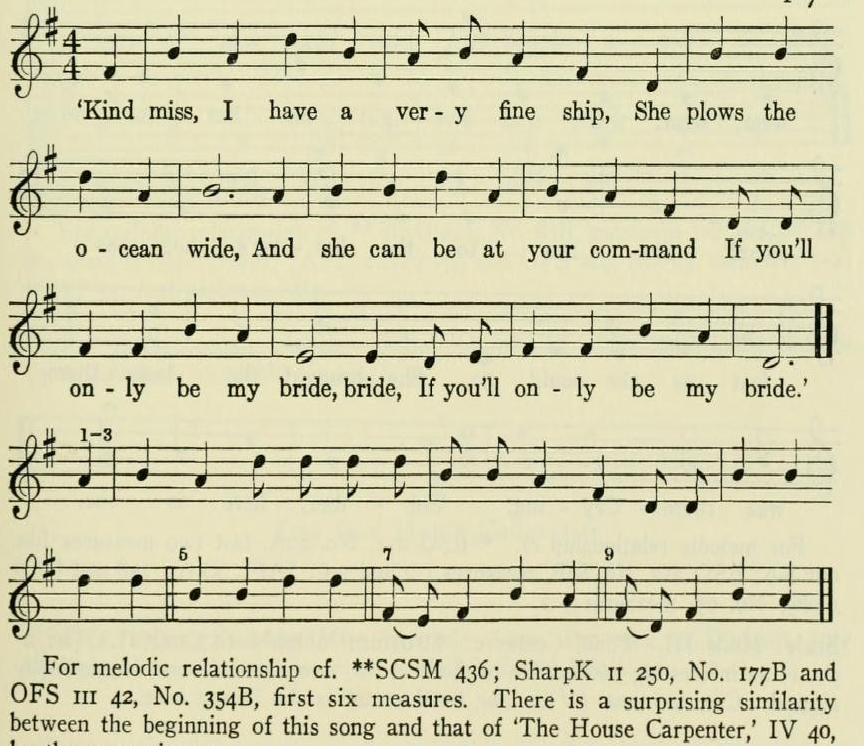
1. 'Kind miss, I have a very fine ship,
She plows the ocean wide.
And she can be at your command
If you will only be my bride, bride,
If you will only be my bride.'
2. 'Kind sir, I know you have a very fine ship,
And she plows the ocean wide.
And she can be at my command;
But I will not be your bride, bride.
But I will not be your bride.'
3. 'Then, kind miss, I have a very fine farm,
It is fifty acres wide.
And it can be at your command
If you will only be my bride, bride,
If you will only be my bride.'
4. 'Kind sir, I know you have a very fine farm
That's fifty acres wide.
And it can be at my command ;
But I will not be your bride, bride,
I will not be your bride.'
5. 'Now, kind miss, I have a very fine horse,
He paces like the tide.
And he shall be at your command
If you will only be my bride, bride.
If you will only be my bride.'
6. 'I know, kind sir, you have a very fine horse
That paces like the tide;
He knows the way to the old grog* shop.
For his master paces him there, there.
For his master paces him there.'
7. 'Kind miss, I have a very fine house
That stands in yonder yard.
And it shall be at your command
If you will only be my bride, bride.
If you will only be mv bride.'
8. 'Kind sir, I know you have a very fine house
That stands in yonder yard.
But who is going to stay with me at night
When you are out playing cards, cards,
When vou are out playing cards?'
9. 'Kind miss, I never did play cards,
I never thought it right.
But if you'll consent to marry me
I'll stay with you at night, night,
I'll stay with you at night.'
10. 'Sence you are so quarrelsome.
So thundering hard to please.
When you get old and pinched with cold
I hope to God you'll freeze, freeze,
I hope to God you'll freeze!'
11. 'When I get old and pinched with cold
It won't be you to keep me warm;
I'll get somebody I love much better
And lie closer in his arms, arms,
And lie closer in his arms.'
[*tavern, where you can buy (grog) alcohol]
4. Madam, Mozelle I've Come Courting
This is a fragment of that version of the courting dialogue which Barry (JAFL xxiv 341-2) reported from the singing of an Irish-man in Boston, beginning "Madam, I have come a-courting." The first two words represent, one guesses, a misunderstanding of "mademoiselle.''
'Madam Mozelle. I've Come Courting.' Contributed by H. F. Shaw, with the notation that it is from "the eastern part of North Carolina."
Madam Mozelle, I've come courting,
Your kind heart I hope to win;
And, if you will entertain me,
Truly, I will call again.
5. Miss, Will You Have a Farmer's Son?
Here the courting dialogue (see 'A Paper of Pins,' 'Madam, Will You Walk,' 'The Courting Cage,' 'Madam Mozelle, I've Come Courting,' 'The Quaker's Wooing') is turned from its usual purpose of satire to the praise of the Forty-niners and gallant Southern lads. In this form it has not been found elsewhere.
'Miss, Will You Have a Farmer's Son?' From a manuscript note-book in which Mrs. Harold Glasscock of Raleigh had set down songs learned from her mother, most of which she can sing. Dr. White borrowed the notebook in 1943 and made this and other transcripts from it.
1. 'Miss, will you have a farmer's son?'
'No, no, not a farmer's son.
He is rough and he is so tough.
No, no, not a farmer's son.'
2. 'Miss, will you have a shoemaker's son?'
'No, no, not a shoemaker's son.
It's peg a little here and peg a little there,
No, no, not a shoemaker's son.'
3. 'Miss, will you have a California boy?'
"Yes, yes, a California boy.
He looks so bold with his pockets full of gold,
Yes, yes, a California boy.'
4. 'Miss, will you have a Dutchman's son?'
'No, no, not a Dutchman's son.
He makes such a fuss about his buttermilk and mush,
No, no, not a Dutchman's son.'
5. 'Miss, will you have a Southern lad?'
'Yes, yes, a Southern lad.
He looks so neat and he kisses so sweet,
Yes, yes, a Southern lad.'
6. Lucindy, Won't You Marry Me?
A fragment of a courting song not elsewhere, so far as I can learn, reported by collectors.
'Lucindy, Won't You Marry Me?' Received in 1922 from Pickens.
Lucindy, won't you marry me,
Won't you marry me in the mornin'?
If you'll marry me your mother'll
Cook a shine-eyed hen.
7. Soldier, Soldier, Won't You Marry Me?
Miss Gilchrist, JEFDSS in 122-3, reporting Newell's account of this "nursery game-song" in his Games and Songs of American Children, is "inclined to think" it is of Scottish origin. It seems not to be of record earlier than the nineteenth century, and, apart from Newell's report and the Virginia texts reported by Davis (FSV 236), not to be a game song in America. It is reported as traditional song from Glasgow (JEFDSS in 121 ), Gloucestershire (JEFDSS III 121), Newfoundland (ESN 140-1), Vermont (VFSB 61), Virginia (JEFDSS iii 122, JAFL xxxiii 158, FSV 236), West Virginia (FSS 467), Kentucky (BKH 77-8, SharpK 11 41 ), Tennessee (SharpK 11 41, BTELS v 35-7). North Carolina (SharpK II 40), the Ozarks (OFS I 289-90), Indiana (BSI 357), and Nebraska (ABS 224-5), and is also in Airs. Richardson's American Mountain Songs (51). The six texts in our collection do not vary greatly.
A. 'Soldier, Soldier, Won't You Marry Me?' Contributed by C. M. Hutchins of Durham, apparently in 1913.
1. 'Soldier, soldier, won't you marry me
With your rifle, fife, and drum?'
'How can I marry such a pretty little girl
If I have no shoes to put on?'
2 Away she ran. as fast, as fast,
As fast as she could run.
And got a very nice pair of shoes.
Says. 'Soldier, put them on.'
So for several stanzas, changing shoes to coat, hat, etc. Then:
'Soldier, soldier, won't you marry me.
With your rifle, fife, and drum?'
'How can I marry such a pretty little girl
When I have a wife at home?'
Away she ran. as fast, as fast.
As fast as she could run.
'And if you have a wife at home.
I tiiink I had hetter be gone.'
B. 'Soldier, Soldier, Will You Marry Me?' From Miss Amy Henderson of Worry, Burke county, about 1914. The refrain line is slightly different here. The first stanza runs:
'Soldier, soldier, will you marry me?'
With your rifle, fife and drum.
'How can I marry such a pretty girl as you?
I've got no shoes to put on.'
She ran to the tailor, tailor shop,
Fast as she could run,
And got him the finest shoes she could get;
'Soldier, put these on.'
The series runs through socks, coat, shirt, hat; and it ends :
'How can I marry such a pretty girl as you
When I've got a wife at home?'
C. 'Soldier, Soldier, Won't You Marry Me?' Contributed by Thomas Smith of Zionville, Watauga county, in 1915. With music by A. J. Burrus. Smith notes: "The song . . . was sung by J. W. Lawrence. I write it from memory, as it has been over 20 years since I have heard it sung. Other people sang it 20 or 25 years ago. The tune is still well known." The series is hat, boots, coat, pants; and it ends rather drastically:
'How can I marry such a damn little bitch
And me got a wife at home?'
D. 'Soldier, Soldier, Won't You Marry Me?' Contributed by Mrs. R. D. Blacknall of Durham, with the notation "known since 1862." The refrain line here is 'With your rifle, fife, and drum.' The series is cap, boots, coat; the ending as in A.
[Sung by J.D. Lawrence 1915; Text: Mrs. R.D. Blacknall]
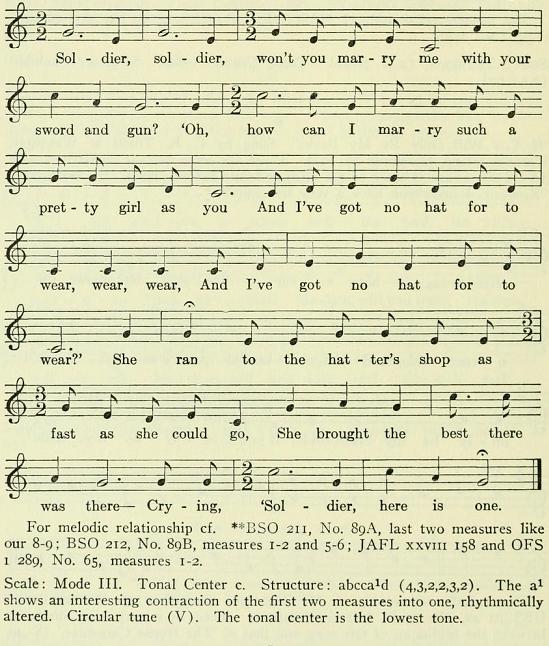
[Sung by Jean Holiman 1922; Text: Mrs. R.D. Blacknall]
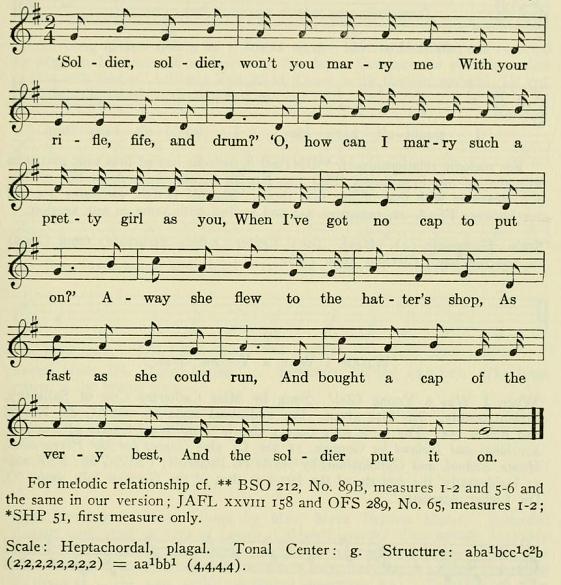
E. 'Soldier, Soldier, Won't You Marry Me?' Reported by Mrs. Sutton from the singing of Myra (Mrs. J. J.) Miller of the Brushy Mountains, Caldwell county. The series here is coat, shoes, hat, pants, sword, and
a horse.
F. No title. Contributed by Minnie Stamps Gosney of Wake county. The series is shoes, socks, trousers, shirt, coat, collar, tie, hat, gloves — all, apparently, that the singer could think of.
8. The Quaker's Wooing
Compare 'A Paper of Pins,' 'Madam, Will You Walk,' 'The Courting- Cage.' This particular satire on the wooer is not always d'stinct from these and other wooing dialogues. 'Old Simon,' reported throuh Wilthiro (FSUT JJ), 'The Wooing,' from Michigan (BSSM 417-icS), and 'The Drunkard's Courtship,' from North Carolina (FSRA 199-200) are kindred pieces. What may fairly be reckoned forms of 'The Quaker's Wooing?' have been reported from New England (FSONK 276-8), Virginia (FSV 235-6), Arkansas (OFS 111 58-60), Missouri (BSM 265, OFS 111 258-9), Ohio I BSO 293-4). Indiana (JAFL xlix 247, SFLQ 111 206, v 182-3), Michigan (BSSM 424-7), and Iowa (ABS 223-4). In many of these cases it is a play-party song.
"Madam, I am Come A-courtin' " from the manuscript songbuok of Mrs. Harold Glasscock of Raleigh, lent to Dr. White in 1943. The songs in this book Mrs. Glasscock learned from her parents.
1. Madam, I am come a-courtin',
Oh, dear, oh dear, oh, dear me.
I'm for pleasure, not for sporting,
Oh. dear, oh, dear, oh, dear me.
2. 'Madam, I have gold and silver,
Oh, dear, oh, dear, oh, dear me.'
'Go right home and tell your father,
Tiddle dum dink dum dink dum da.
3 'That you could not get me read,
Tiddle dum dink dum dink dum da.'
'Madam, I am a Presbyterian,
Oh, dear, oh, dear, oh, dear me.'
9. The Old Man's Courtship
For the history of this old English song and its occurrence in modern times, see BSM 264, and add to the references there given Herd's Ancient and Modern Scottish Songs (11, 33-4 of the 1869 reprint of the 1776 edition). Miss Mason's Nursery Rhymes and Countrx Songs, p. 33, Essex (JEFDSS 111 130-1), Pennsylvania
(MMP [^(1 edition of NPM] 307-8). Virginia and South Carolina (FSV 173, OSC 132-3). Arkansas (OFS 1 293-4), Missouri (OFS I 291-2), Ohio (BSO 132-5), Indiana (SFLQ 111 207), and Michigan (BSSM 413-14). It is interesting to find that of the five texts in our collection only one shows the familiar "old grey beard" refrain. The other four all belong to one tradition with "old boots and leggins" or "old boots a-leakin' " in the refrain. Yet the variations of folk fancy on the theme of ugly old age prompt the printing of all five of the texts.
A. 'Old Shoe Boots and Leggins.' Contributed by Mrs. Will N. Coley of Raleigh in 1922. The second and fourth lines of stanza 1 constitute a refrain to be repeated in each stanza.
1. My mammy she told me to ask him in
— Oh, but I won't have him —
I ask him in, and the way he did grin!
With his old shoe boots and leggins.
2. My mammy she told me to give him some pie,
I give him some pie and he looked like he'd die.
3. My mammy she told me to put him to bed,
I put him to bed and he looked like he was dead.
4. My mammy she told me to waken him up,
I wakened him up and he shook like a duck.
5. My mammy she told me to saddle his horse.
I saddled his horse and bid him be off.
B. No title. Contributed by Miss Minnie S. Gosney of Raleigh. As in A, the refrain is given only with the first stanza.
1. Mother, my mother, bid me open the door
— I won't have him —
I opened the door and he fell on the floor
With his old shoes and leggins.
2. Mother, my mother, bid me give him a chair,
I gave him a chair and he called me his dear.
3. Mother, my mother, bid me light his pipe,
I lit his pipe and he smoked like a snipe.
4. Mother, my mother, bid me put him to bed.
I put him to bed and he stood on his head.
5. Mother, my mother, bid me wake him up,
I woke him up and he smacked like a duck.
6 Mother, my mother, bid me saddle his horse,
I saddled his horse and I ordered him off.
C. 'The Old Man.' Contributed by Gertrude Allen (afterwards Mrs. Vaught) of Taylorsville, Alexander county. This has "beard" instead of "boots" in the refrain. The third line of the opening stanza is a refrain closing each stanza.

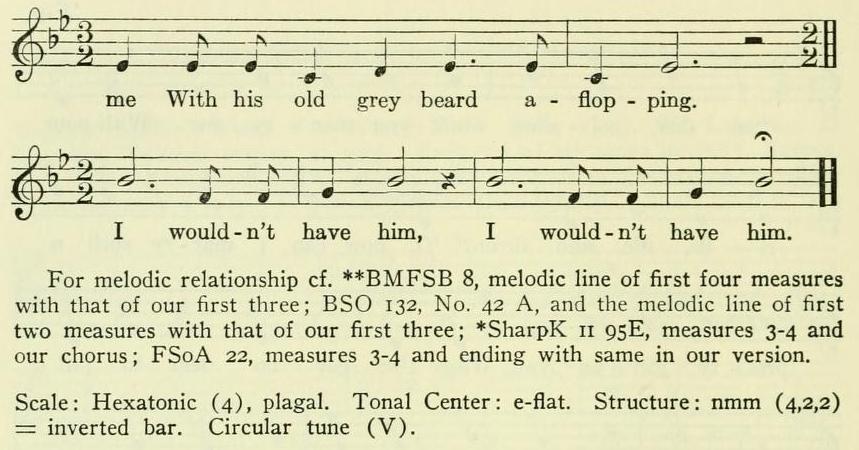
1. My mother brought an old man
Home to see me
With his old grey beard a-flopping.
Chorus: But I wouldn't have him,
I wouldn't have him.
2. My mother brought him a dish
And he swallowed a fish.
3. My mother gave him a stool,
But he acted like a fool.
4. My mother gave him a pie
And he swallowed a fly.
5. With a head like a mule,
He acts like a fool.
6. My mother gave liim some cake,
And he swallowed a snake.
7. My mother showed him the door,
But he fell on the floor.
8. My mother gave him a saddle
And he rode off a-straddle.
D. 'Old Boots." Contributed by Miss Ida C. Houston of Winston-Salem, with the notation: "This was sung in the family of the little girl who wrote it for many years by an old servant whose mother and grandmother sang it." The second half of line 1 and all of line 3 of stanza 1 constitute the refrain, repeated with each stanza.
1. My mama told me to open the gate — I will not have him —
I opened the gate and he couldn't walk straight.
And his old boots was a-leaking.
2. My mama told me to open the door,
I opened the door and he fell in the floor.
3. My mama told me to hand him a stool,
I handed him a stool, and he looked like a fool.
4. My mama told me to hand him a shovel,
I handed him a shovel, and he looked like the devil.
5. My mama told me to set tlie table,
I set the table, and he said he wasn't able.
E. 'Old Boots.' Contributed by Katharine Malloy of Yanceyville, Caswell county. Refrain as in D.
1. My mama told me to hand him the pie —
I will not have him —
I handed him the pie, and he swallowed a fly,
And his old boots was a-leaking.
2. My mama told me to hand him a fish,
I handed him a fish and he swallowed the dish.
3. My mama told me to put him to bed,
I put him to bed and he lay like he was dead.
4. My mama told me to saddle his horse,
I saddled his horse, and he rode off north.
5. My mama told me to bid him farewell,
I bid him farewell, and I wished him to hell.
10. When I Was a Young Girl
This was originally a children's singing game; many texts from various parts of England are given by Lady Gomme (Gomme ii 362-74). In this country it is most often a piece of social satire, as it is in our text. What holds the various texts together is the "this-a-way that-a-way" refrain. This refrain structure, however,
has also been used in certain cunmlative songs of farm sounds, concerning which see 'McDonald's Farm' in this volume. A song of somewhat related content. 'When I Was a Maid' (to be found in JFSS VIII 148-50), is distinguished from the song here under consideration by the absence of the "this-a-way that-a-way'' re-
frain. Our song is known in various parts of America: in Ontario (JAFL XXXI 151 ), Virginia (FSV 169-70), Kentucky (SFLQ II 1 61 -2;, Indiana (JAFL xxix 189-90 — see the accompanying bibliographical note — and SFLQ iii 221-2), and Ohio (JAFL XL 15, a reduced form of two stanzas).
'When I Was a Young Girl.' Obtained from Catharine Cox of Salisbury, Rowan county. Not dated. With the tune.
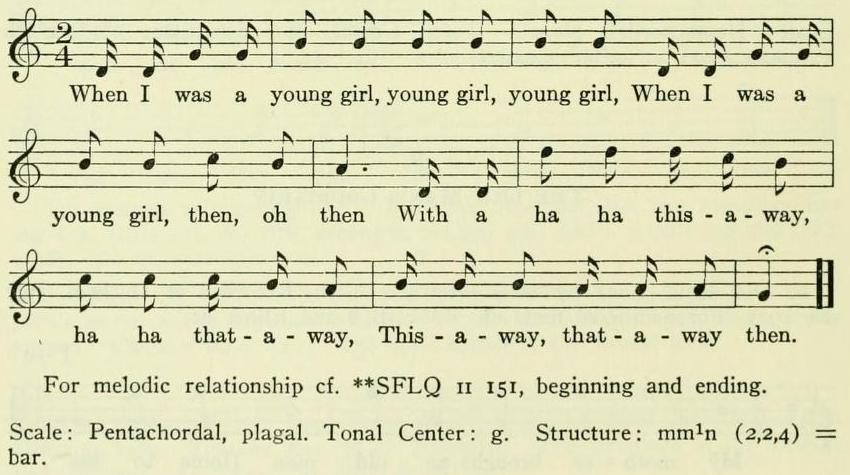
1. When I was a young girl, young girl, young girl,
When I was a young girl, then, oh then.
'Twas ha ha this-a-way, ha ha that-a-way,
This-a-way, that-a-way then.
2. Boys came courtin', courtin', courtin'.
Boys came courtin'; then, oh then
'Twas ha ha this-a-way, ha ha that-a-way,
This-a-way. that-a-way then.
3. Then I got married, married, married,
Then I got married; then, oh then.
'Twas ha ha this-a-way, ha ha that-a-way,
This-a-way, that-a-way then.
4. Then I had a quarrel, quarrel, quarrel,
Then 1 had a quarrel; then, oh then.
'Twas get away this-a-way and get away that-a-way.
This-a-way, that-a-way then.
5. Then I made up, up, up,
Then I made up, then, oh then,
And "twas (smack, smack) this-a-way, (smack, smack)
That-a-way.
This-a-way, that-a-way- then.
6 Then he got sick, sick, sick.
Then he got sick; then, oh then
'Twas dear doctor this-a-way, dear doctor that-a-way.
This-a-way, that-a-way then.
7 Then he died, died, died,
Then he died; then, oh then
Twas (sniff, sniff) this-a-way, (sniff, sniff) that-a-way,
This-a-way, that-a-way then.
8 Going to the funeral, funeral, funeral,
Going to the funeral; then, oh then
'Twas (sniff, sniff) this-a-way, (sniff, sniff) that-a-way,
This-a-way, that-a-way then.
9 Coming from the funeral, funeral, funeral.
Coming from the funeral — then, oh then
'Twas ha ha this-a-way, ha ha that-a-way,
This-a-way, that-a-way then.
11. Where Are You Going, My Pretty Maid?
This song of the milkmaid, still remembered in England —Somerset and Devon (JFSS ii 9-10), Yorkshire (JFSS 11 J70) — is known in various parts of English-speaking America: Newfoundland (BSSN 138-g). New Jersey (JAFL Lii 58-9. a some- what lewd derivative), Virginia (SharpK 11 156-8), Mississippi (JAFL XXXIX 150-1, FSM 277-8). Missouri (OFS I 330). Ohio ( BSO 188-90). Nebraska (ABS 228-30). The content of the various texts varies considerably, but they may all be considered forms of the same song. There are two in our collection.
A. 'Seventeen Come Sunday.' Sent in by Mrs. Sutton, with the following account of the singer:
"Over beyond Sugar Loaf in Henderson County there lives an old man who sings ballits. He makes whiskey, too, or did, and spent a good deal of time in Atlanta. He has a cabin to which we couldn't go with the car.
"We parked way up on a hillside and climbed down a steep winding path between laurel thickets and found him sitting by the woodpile, strumming a banjo. He said it was 'too party to waste time plowin'.' He also asked us to 'tarry till even.' . . . Not many of his songs were 'fitten to sing before the wimmern,' but he accepted us as kindred spirits and sang them anyway. . . . He sang a number of sea ballads. . . . He also called the young woman he was courting in the hope that she would consent to becoming his fourth wife his 'doney.' Sometimes he made it 'doney gal.'
"The song he liked best of those he sang was 'Seventeen Come Sunday.' When he finished singing this song he observed that 'seventeen is jist about the right age to catch a gal. Ef she's older than that she's apt to be gittin' oneasy and it comes too easy.' We asked him if the 'doney' he had now was over that. He said she was. 'When a feller gits as old and wore out as I am he near 'bout has to take him a gal off'n the cull list,' he remarked philosophically. 'I've had me three young wives, and this un I'm a-courtin' now ain't fur from the whit- leather stage. But, at that, she ort to outlast me.' "
1. 'Where are you going, my pretty maid?
Oh, where are you going, my honey?'
She answered me most modestly,
'An errand for my mommy.'
2. 'How old are you. my pretty maid?
How old are you, my honey?'
She answered me most modestly,
'I'm seventeen come Sunday.'
3. 'Where do you live, my pretty maid?
Where do you live, my honey?'
She answered me most modestly,
'In a cottage with my mommy.'
4. 'Will you marry me. my pretty maid?
Will you marry me. my honey?'
She answered me most modestly,
'If it wasn't for my mommy.'
B. 'Where Are You Going, My Pretty Fair Maid?' From a manuscript notebook of Mrs. Harold Glasscock of Raleigh lent to Dr. White in December 1943. Most or all of her songs Mrs. Glasscock learned from her mother.
1. 'Where are you going, my pretty fair maid?
Where are you going, my honey?
She answered me with a 'Ha ha ha,
I'm going to see my mammy.'
Tum a hoo ra ra tum a hoo ra ri
Turn a hoo ra raddle dick a dandy.
2. Her shoes were black and her stockings were white
And her buckles shone like silver;
She had a dark, rolling eye
And her hair hung 'round her shoulder.
Tiitii a hoo ra ra imu a hoo ra ri
Tuni a hoo ra raddle dick a dandy.
3. "Will you have me, my pretty fair maid?
Will you have me, my honey?'
She answered me with a 'ha ha ha,
I'll have most anybody.'
Tum a hoo ra ra tum a hoo ra ri
Tum a hoo ra raddle dick a dandy.
12. Madam, I Have Gold and Silver
Here a very familiar courting dialogue is turned unexpectedly in the last stanza into a returned-disguised-lover story. Up to the last stanza our text is very close to one from Sussex given in JFSS IV 297-8. For the more customary form of the song and references to its occurrence in England and America, see BSM 506. and add Indiana (SFLQ in 206).
'Seven Long Years.' Reported by Mrs. R. D. Blacknall of Durham, with the note: "Sung by a Negro servant, Maria McCauley, presumably ex-slave of the Chapel Hill McCauleys. Heard forty-five years ago." Mrs. Daisy Jones Couch of Durham remembered the first stanza only.
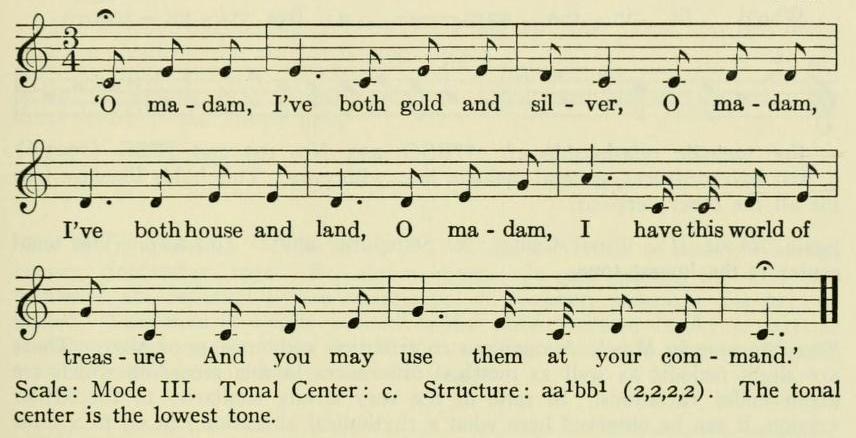
1. 'O madam, I have gold and silver,
O madam, I have both house and land.
O madam, I have this world of treasure
And you may use them at your command.'
2. 'Oh, what care I for your gold and silver?
Oh, what care I for your house and land.'
Oh, what care I for your world of treasure
When all I want is a handsome man?'
3. 'O madam, don't place your love on beauty,
For beauty is a thing that will decay;
Just like a rose, pulled soon in the morning.
That before noon will fade away.'
4. 'Oh, my true love's gone over the ocean;
Oh, seven long years he's been gone from me.
But seven more I'll wait for him.
If his dear face I ever shall see.'
5. 'The ripest fruit soonest is rotten;
The hardest love soonest is cold.
That young man's love is soon forgotten,
So, my dear miss, don't speak so bold!'
6. That look, that voice were so famihar
Her lovely face turned pale as clay;
She spied the ring upon his finger —
And on the ground she swooned away.
13. One Morning in May
For something of the history of this song — more commonly known as 'The Nightingale' — and its currency in tradition, see BSM 239, and add to the references there given Kentucky (FSKH 20-1), Florida ( SFLQ viii 171-2), Arkansas (OFS i 268), Missouri (OFS I 266-8, 288-9), Ohio (SFLQ 11 154-5, BSO 230), and Tennessee (BTFLS vi 34-5, a text and tune recorded in Tennessee but learned in Nebraska). One of our versions was sung by a schoolgirl in the sixth grade. Very likely many sing it with no understanding of its original meaning.
A. 'One Morning in May.' Reported by Mrs. Sutton from the singing of Myra Barnett, who knew so many of the old songs. Mrs. Sutton says she has never run into it except in Caldwell and Avery counties (Myra came from the Brushy Mountains in Caldwell); but it is reported also from Watauga and Montgomery counties, and is in fact very widely known in the southern Appalachians.

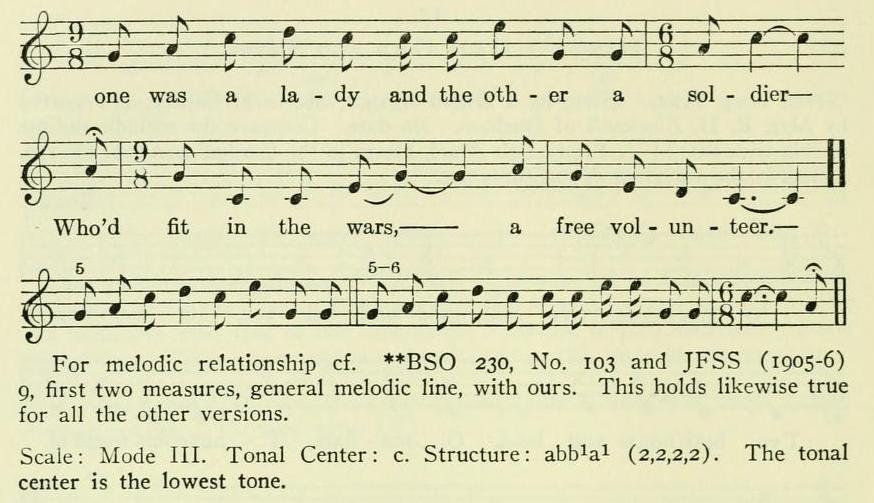
1. One morning, one morning, one morning in May
I spied a fair couple a-making their way;
But one were a lady and the other a soldier
Who'd fit in the wars, a free volunteer.
2. 'Good morning, good morning,' the lady she said.
'Good morning, good morning,' the soldier replied.
'I'm happy fur to meet you here this morning,
'Though you are a lady and I'm a soldier.'
3. They took hand and hand and went on together.
But where they did go, that I do not know where.
Then said the lady, 'Let's go to the spring,
Where the waters are sliding and the nightingales sing.'
4. 'Now stop,' said the soldier, 'I'll tell you a riddle,'
And out of his knapsack he drew a fine fiddle.
He tuned up his fiddle to a common high string
And played by the waters where the nightingales sing.
5. Then said the soldier, 'We'll soon have to part,'
'No, no,' said the lady, 'play that tune once more.'
He tuned up his fiddle to a common high string
And played the tune over and over again.
6. Then said the lady, 'Won't you marry me?'
'No, no,' said the soldier, "that never can he.
I've a wife in Mair Manders, little children there's three,
As pretty little children as you ever did see.
7. 'Fair damsel, fair damsel, take warning by me
And when you see soldiers don't love them so free.
I've a wife in Flair Flanders, little children's there's three.
As pretty a little woman as you ever did see.
8. 'I'll go back to Flair Flanders. I'll stay there one year,
In the place of cold water, my drink will be beer.
And when I return, it'll be in the spring;
Where the waters run sliding and the nightingales sing.'
[Anonymous Contribution no place or date]
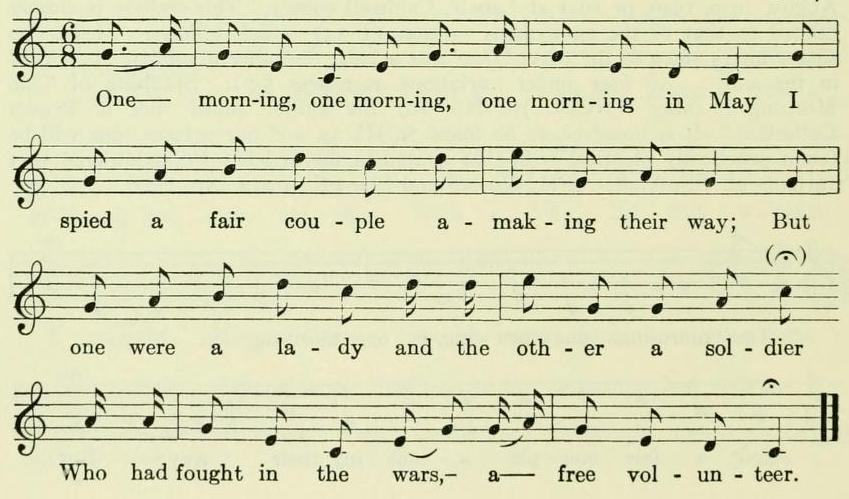
B. 'One Morning in May.' Contributed by Miss Jewell Rollins of Pekin, the last stanza into a returned disguised lover story. What the war* may be the editor does not know.
1. As I walked out one morning, one morning in May,
I spied a nice couple a-reaping of hay;
One was a lady, a lady so fair.
And the other a soldier of the grand jury* war.
2. 'Oh, now,' said the lady, 'will you marry me?'
'Oh no,' said the soldier. "I can't marry you.
I've a wife in the army and children I've three
And as beauteous a lady as ever you'll see.'
3. "Uh, now,' said the lady, "play me one more tune.'
He tuned his fiddle to a very high strain
And played the tune over again and again.
C. 'One Morning in May.' Reported by Professor W. Amos Abrams as sung by a sixth grade schoolgirl at Boone. Watauga county, in September, 1937. The text docs not differ significantly from A.
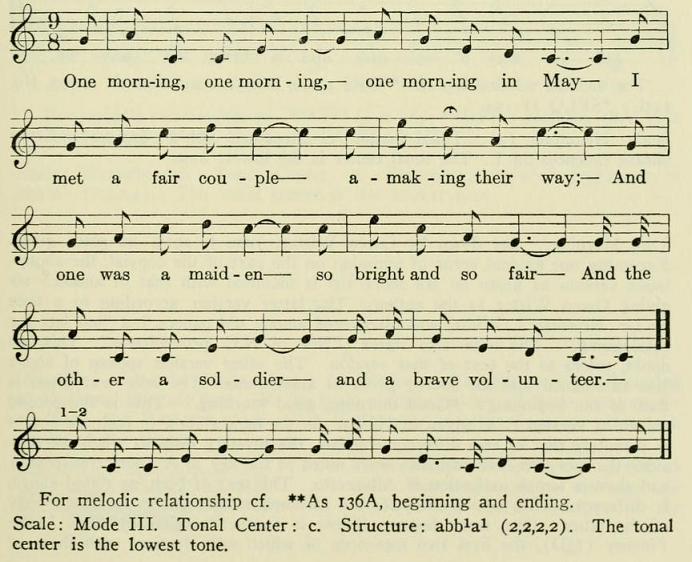
D. 'One Morning in May.' Contributed by Miss Lizzie Fincher from Monroe, Union county, some time in 1921-2. The first stanza only.
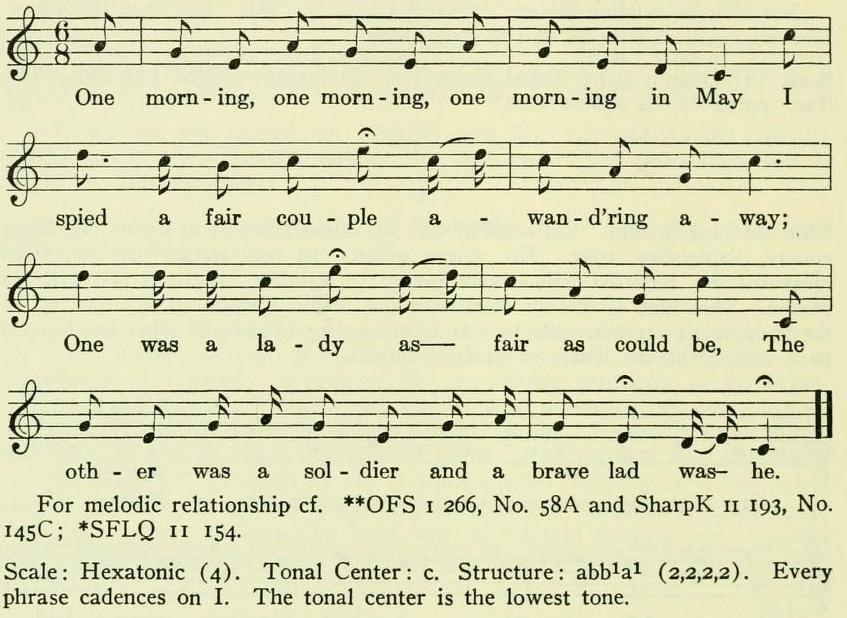
"One Morning," contributed Owen Wiser 1915
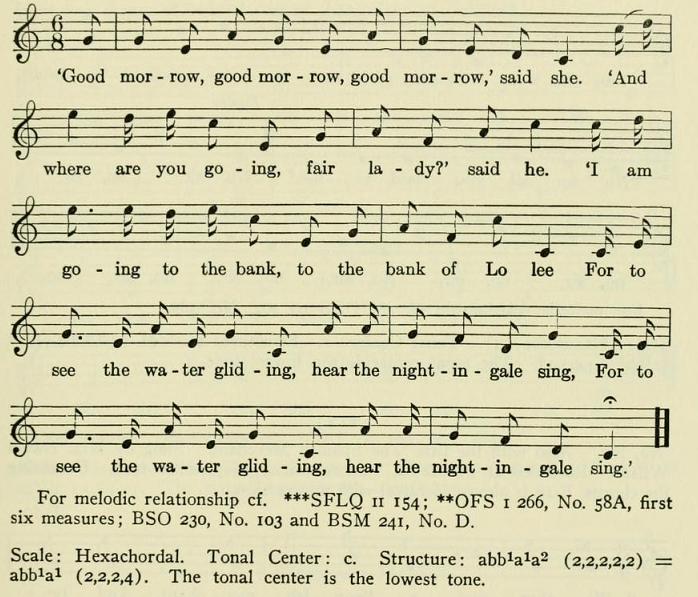
14. No, Sir
This courting song, also known as 'My Father was a Spanish Merchant.' goes back with some changes in the course of time to the seventeenth century and has been many times printed in popular songbooks; see Kittredge's very thorough bibliographical note to Tolnian's Ohio texts, JAFL xxxv 406-7. In some texts it shows contamination with 'Madam, I Have Gold and Silver.' It has been reported as traditional song from Virginia (FSV 237), Kentucky (BKH 81; TKMS 98-101 may be reckoned a form of it), Tennessee (BTFLS III 96), Arkansas (OFS iii 104-5), Ohio (JAFL xxxv 405, BSO 146). Indiana (Wolford 73-4, as a play-party
song), and Iowa (MAFLS xxix 44); it is listed in Miss Pound's syllabus: forms of it appear in Sharp's One Hundred English Folk Songs and in JFSS iv 208 (Dorset); and it is no doubt known and sung much more widely than this list would indicate.

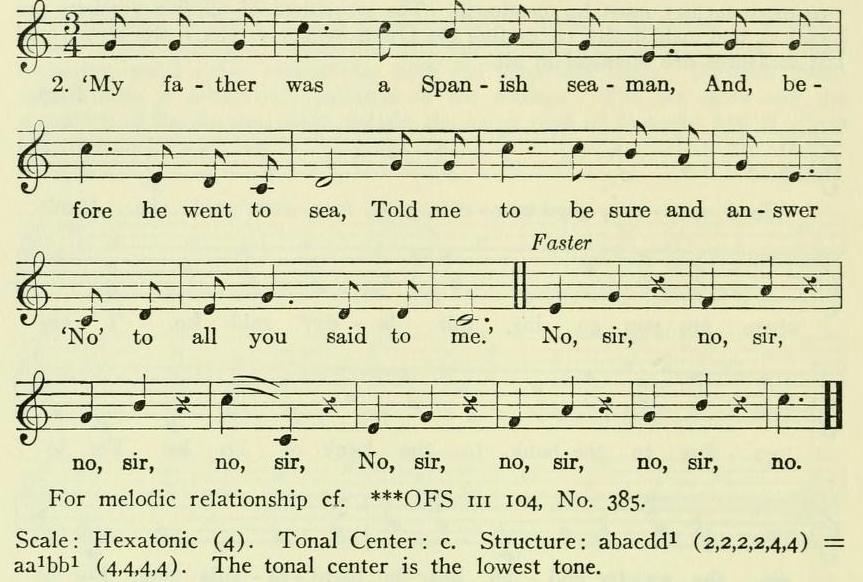
A. 'O No, John.' From the manuscripts of Obadiah Johnson of Crossnore. Avery county. This is much the fullest of our North Carolina versions.
1. On yonder hill there stands a creature,
Who she is I do not know;
I'll go and court her for her beauty.
She must answer yes or no.
O no, John! No, John! No, John! No!
(This is the refrain line, sung in the person of the girl after each stanza sung by the man.)
2. 'My father was a Spanish captain.
Went to sea a month ago.
First he kissed me. then he left me;
Bid me always answer No!'
3 'O madam, in your face is beauty,
On your lips red roses grow.
Will you take me for your lover?
Madam, answer yes or no.
4. 'O madam, I will give you jewels,
I will make you rich and free,
I will give you silken dresses.
Madam, will you marry me?
5. 'O madam, since you are so cruel
And that you do scorn me so,
If I may not be your lover.
Madam, will you let me go?
6. 'Then I will stay with you forever
If you will not be unkind.
Madam, I have vowed to love you;
Would you have me change my mind?
7 'O hark! I hear the church bells ringing;
Will vou come and be my wife?
Oh, dear madam have you settled
To live single all your life?'
B. 'No, Sir." From the manuscript songbook of Miss Lura Wagoner of Vox, Alleghany county, lent to Dr. Brown in 1936; the entries in the book were probably made some twenty or more years earlier.
1. 'Tell iiie one thing, tell me truly,
Tell nie why you scorn nie so.
Tell nie. when 1 ask a question.
Yon will always answer No.'
Chorus: No, sir, no, sir, no, sir, no, sir,
No, sir, no, sir, no, sir, no.
2. 'My father was a Spanish merchant,
And, before he went to sea,
He told me to be sure and answer
"No" to all you said to me.'
3. 'If, when walking in the garden,
Plucking flowers all wet with dew,
Tell me. would you be offended
If I walk and talk with you?
4. 'If, when walking in the garden,
I should ask you to be mine
And should tell you that I love you,
Would you then mv heart decline?'
C. 'Spanish Merchant." Obtained by G. D. Harmon from W. K. Harris of Union Mills, Rutherford county. Same as B except that it lacks the first stanza.
["Spanish Merchant;" Ewart Wilson 1929 similar Hauser's version]
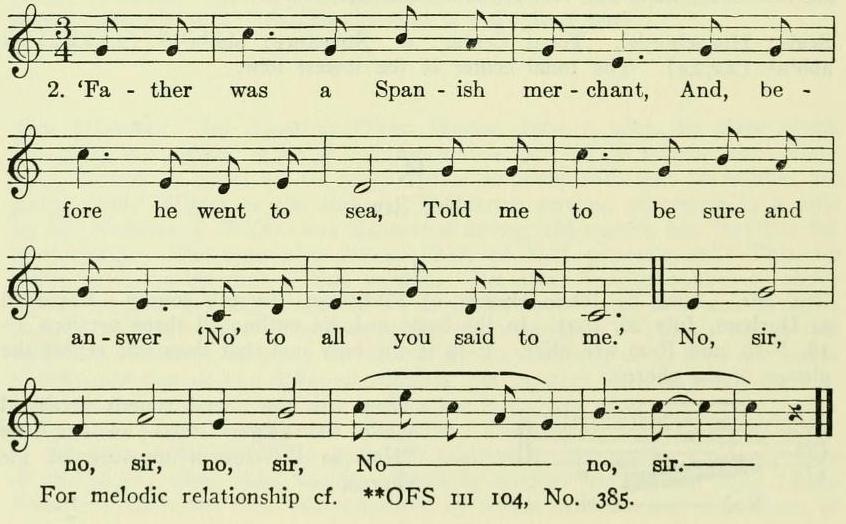
D. 'No, Sir!' Obtained from Aura Holton of Durham in 1922. The text as in C, with direction that the chorus is to be sung by the boy and the girl together. Seems to be a play-party song.
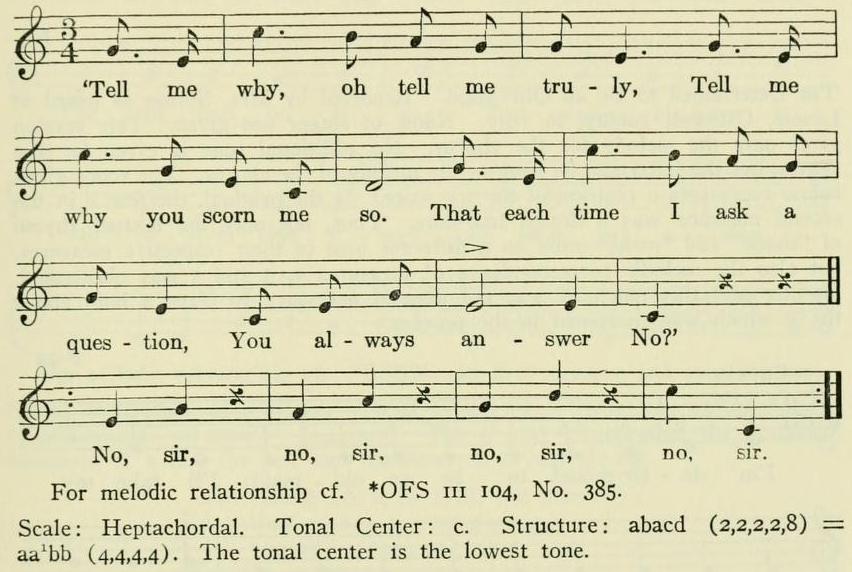
15. Courting Song
Folk singers in America are not averse to social satire of the sort of which this song is an example. The 'Song' is reported also in Florence H. Botsford's Collection of Folk-Songs 131 from Kentucky. For references to other songs of a like temper in Virginia. West Virginia, North Carolina. Missouri. Nebraska, and Wyoming, see BSM 426-8, and add to the references there given Florida (SFLQ viii 192-3) and Iowa (MAFLS xxix 96-7) and for Negro song JAFL xxiv 285. See also 'When Young Men Go Courting' and 'If You Want to Go A-Courtin' in the section of Satirical Songs in this volume.
'Courting Song.' Collected by Mrs. Sutton on the Watauga River near the Tennessee line, from the singing of a schoolteacher with whom she spent the night — which included an amusing example of the technique described in the song; see page 5, above. The last line of each stanza is repeated as indicated in stanza 1.
1. A gentleman came to see me.
He couldn't tell his name;
I knew he came a-courting
Although he was ashamed,
Oh, although he was ashamed.
2. He drew his chair up by my side,
His manner pleased me well.
I hoped the spirit moved him
A loving tale to tell.
3. And there he sat the livelong night
And not a word did say.
With many a sigh and bitter groan
I often wished for day.
4. The chickens they began to crow,
The daylight did appear.
'Howdy do, good morning, sir,
I'm glad to see you here.'
5. He was weary of the livelong night,
He was weary of his life.
If this is what you call courting, boys.
I'll never take a wife.'
6. Whenever he goes in company
The girls all laugh and sport;
They say. 'There goes a blamed old fool
Who don't know how to court,
Oh, he don't know how to court.'
16. Don't Stay After Ten
On the same topic as the 'Courting Song," just given. It is reported in the Pound syllahus and by Randolph from Arkansas (OFS III 86-7).
A. 'Don't Stay after Ten.' An anonymous manuscript in Dr. Brown's hand. no doubt collected by him from one of his informants but accidentally left without notation of its source. Although anonymous, it is given here because it helps to make the H text intelligible.
1. There is one request I make to you
When me you come to see.
You know there is no one in all this world
That's half so dear to me;
But this request I make of you,
That when you come again
To see me in the afternoon,
Don't stay till after ten.
Chorus: Don't stay till after ten, my boy,
Don't stay till after ten.
But come again some other time
And don't stay till after ten.
2. For after ten the moments fly;
I tremble o'er and o'er
Till last ma's image I shall spy
Come creeping to the door.
She's there to execute her threats;
She said she'd surely come
And if you stayed so late again
She'd ask you to go home.
3. Next morning down to breakfast I'd go.
My papa would frown at me
And say, 'My girl, that beau of yours
Is going to hear from me.
That sort of thing I will not stand,
But when he comes again
I'll just walk in and ask him out
If he don't go home by ten.'
B. 'Oh, Don't Stay after Ten." From the manuscript hook of songs of Miss Edith Walker of Boone, Watauga county: secured in 1936. The first two lines of stanza 2 are confused, or at least confusing.
1. I've something sad to say to you
And when he comes again
To meet in the evening
And don't stay after ten.
Chorus: Oh, don't stay after ten, my dear,
Oh, don't stay after ten;
To meet in the evening
And don't go home at ten.
2. And when he comes again (and stays)
(They say) and don't go home, why then
They'll just step in and ask him out
If he don't go home at ten.
3. For after ten the moments fly;
I tremble o'er and o'er
When mama to the dark spot
Comes peeping through the door.
4. To the breakfast table next morning I'll go
And papa will frown on me
And say, 'My daughter, that beau of yours
Is going to hear from me.'
17. I Wouldn't Marry
For the range of songs on this theme, see BSM 262 and add to the references there given Massachusetts (FSONE 211-12). Virginia (SharpK 11, 381-2. FSV 174-5). Kentucky (SFLQ 11 1S3), Tennessee (BTFLS 11 11, v 38), North Carolina (BTFLS'ii II), Arkansas (OFS iii 64, 65, 128). Missouri (OFS 11 351-2. iii 65. 259-60), Ohio (BSO 186-77. 298-9), Indiana (SFLQ in 213-4), Michigan (BSSM 420-1). and Wisconsin (JAFL Xii 20. from Kentucky). Mrs. Steely found three forms of it in the Ebenezer community in Wake county. Scotland knows, or knew, two songs on this subject (Christie I 141-2, 182-3), but it is doubtful that they are the ancestors of any of the American forms. The texts may conveniently be presented in three groups: those in which the man speaks, those in which the woman speaks, and a composite (or antiphonal) form in which now the man speaks and now the woman. Some of the texts are conglomerates of fragments often distantly connected, if at all, with the theme of celibacy.
A. 'Laurie Lee.' Communicated, about 1923, by Miss Kate S. Russell of Roxboro, Person county. [Version A appears to be a version of Charming Betsy]
1. Wouldn't marry an old maid
Tell you the reason why:
Her neck so long and stringy
I'm scared she'd never die.
2. June bug got the golden wing,
Lightning bug the flame.
Bedbug got no light at all
But he gets there just the same.
3. Rich woman wears the ruffle dress,
Poor girls wear the plain.
Eve wore no dress at all
But she got there just the same.
4 Raccoon got the bushy- tail.
Possum tail is bare;
Rabbit got no tail at all,
Nothing hut a hunch of hair.*
* Manuscript has "hare" ; whether the pun really belongs in the song or is the momentary inspiration of the writer of the manuscript the editor does not know. This fourth stanza will reappear in the section on Bird
and Beast Jingles.
B. 'I Wouldn't Marry an Old Maid.' From Lucille Massey, Durham. Not dated.
1. I wouldn't marry an old maid,
I'll tell you the reason why:
Her neck is so long and stringy
I fear she'd never die.
2. I wouldn't marry an old maid.
I'll tell you the reason why:
She'd stick her nose in a pone of bread
And call it chicken pie.
3. I wouldn't marry a rich girl,
Pll tell you the reason why :
She is crazy to wash her clothes
And hang them out to dry.
C. No title. From Lucille Cheek of Chatham county. First stanza only, as in B.
D. 'I Wouldn't Marry.' Collected by Julian P. Boyd from Catherine Bennett, one of his pupils in the school at Alliance, Pamlico county. A single stanza, the same as the first stanza of B with "poor sal" substituted for "old maid."
E. 'I Wouldn't Marry.' From W. B. Leake of Rich Square, Northampton county. Again a single stanza, the first of B, with "city gal" substituted for "old maid."
F. 'A Farmer Boy.' From Miss Mamie Mansfield, Durham, in July 1922. With this we turn to texts in which the woman speaks.
I love to wash the dishes,
I love to sweep the floor.
I love to kiss that pretty little boy
Behind my parlor door.
Chorus: A farmer's boy, a farmer's boy,
He's the one for me;
If ever I get married
A farmer bride I'll be.
2. I love to feed the chickens,
I love to milk the cow.
I love to hear that farmer boy
Come whistling from the plow.
3. I wouldn't marry a preacher,
I tell you the reason why
He stands upon the pulpit
And makes the people cry.
4. I wouldn't marry a doctor,
I tell you the reason why
He goes all over the country
And makes the people die.
5. I wouldn't marry a blacksmith,
I tell you the reason why
His neck is so long and thin
I am afraid he'll never die.
G. 'Farmer Boy for Me.' Sung by Miss Annie Hamlen (later Mrs. E. S. Swindell), Durham. Three stanzas and chorus. The first two stanzas and the chorus the same as the chorus and stanzas 4. 3 of F ; the third
stanza is new:
I would not marry a lawyer.
I'll tell you the reason why;
He gets up on the stand
And always tells a lie.
H. 'I'm Determined to Be an Old Maid." From Gertrude Allen (later Mrs. Vaught), Taylorsville, Alexander county. Here tlie familiar "I'm determined to he an old maid" drifts in the last stanza to the "farmer boy" theme of F. The tune was taken down by Miss Vivian Blackstock.


1. I'll not marry a man that's rich,
For he'll get drunk and fall in a ditch;
Sei I'll not marry at all,
I'll not marry at all.
Chorus: I'm determined to be an old maid;
I'll take my stool and sit in the shade,
And I'll not marry at all,
I'll not marry at all.
2. I'll not marry a man that's poor,
He'll go begging from door to door;
So I'll not marry at all.
I'll not marry at all.
3. I'll not marry a man that's young.
For he'll deceive with a flattering tongue;
So I'll not marrv at all,
I'll not marry at all.
4. I'll not marry a man that's old,
For he'll do nothing but sit and scold;
And I'll not marry at all,
I'll not marry at all.
5. But I will marry a farmer's boy.
For he will always have employ;
So I will marry after all, after all.
I. 'Farmer's Wife I'll Be.' Reptjrted by W. B. Covington as heard in Scotland county. Two lines only:
Farmer's wife, farmer's wife, farmer's wife I'll be.
If I ever marry in my life, farmer's wife I'll be.
J. 'I Won't Marry at All.' Sent in by the Reverend J. M. Downiim as obtained from Alex Tiigman of Todd, Ashe county, in 1922. Six stanzas and chorus. Chorus and stanzas 1, 2, 3, 4 as in H chorus and stanzas
4. 3, 2, I ; the last two stanzas introduce new matter:
3. I won't marry a man named Bill
Though he loves me fit to kill;
I won't marry at all,
I won't marry at all.
6. I won't marry a man named Ned
Tho he's sweet as gingerbread;
I won't marry at all,
I won't marry at all.
K. 'I Won't Marry at All.' From Ethel Brown, Catawba county. The chorus and stanzas 2 and i of H.
L. 'I'm Determined to Be an Old Maid.' Reported by Mrs. Sutton as heard in 1917 "in the mountains." Evidently not complete; "There were several other types of men she was determined not to marry." The three stanzas given are the chorus and stanzas 1 and 2 of H.
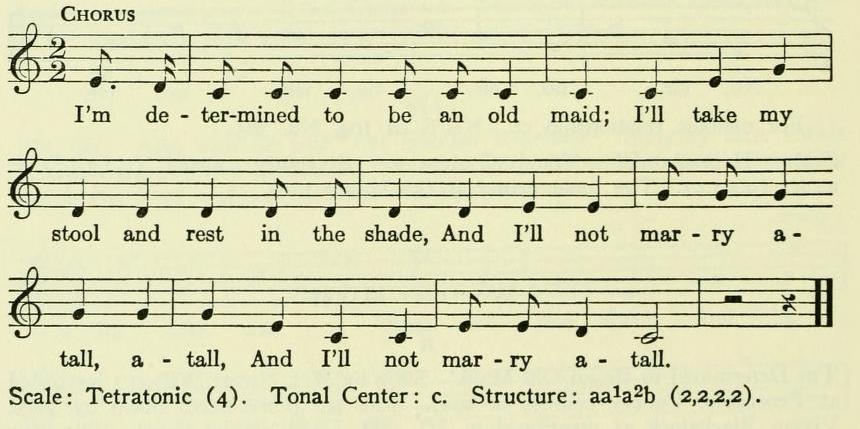
M. 'An Old Man.' Reported in 1915 by Miss Iris Chappelle of Creedmoor, Granville county, as obtained from her mother, who learned it as a child. This and the next two texts might claim the status of distinct songs, being devoted to the yovmg girl's repugnance at the thought of marrying an old man.
1. I would not marry an old man.
I will tell you the reason why;
His face is always dirty,
His chin is never dry.
Chorus: An old man, an old man,
An old man is gray.
But a young man's heart is full of love,
And away, old man, away.
2. I would rather marry a young man
With an apple in his hand.
Than marry an old man
With forty acres of land.
3. I would rather marry a young man
With forty cows to milk
Than marry an old man
All robed in satin and silk.
4. An old man he comes creeping in
And says he's tired of life;
But a yoimg man he comes skipping in
And says 'Kiss me, my dear wife.'
N. 'I Would Not Marry an Old Man.' From the manuscript notebook of Mrs. Harold Glasscock of Raleigh, lent to Dr. White in 1943. The songs in this notebook Mrs. Glasscock learned from her parents. Substantially the same as stanzas 1 and 4 and the chorus of M, yet there are interesting minor differences of diction;
1. I would not marry an old man,
I'll tell you the reason why:
His lips are always hanging down
And his chin is never dry.
Chorus: An old man is gray, an old man is gray;
A yonng man's heart is fnll of love.
Glo away, old man, go away.
2. An old man comes hobbling in
Quite weary of his life;
A young man conies skipping in;
'Come kiss me, my dear wife.'
O. 'Old Maid's Song.' From Alexander Tugman of Todd, Ashe county. Four stanzas; the first two as in H, the other two slightly different:
3. I'll not marry a man that's young,
For he'll give me a piece of his tongue;
And I'll not marry a-tall, a-tall,
And I'll not marry a-tall.
4 I'll not marry a man that's old,
For he will love me less than gold ;
And I'll not marry a-tall, a-tall.
And Fll not marry a-tall.
P. 'The Old Maid.' Reported by Mrs. Sutton from Madison county, with one stanza not given in L:
I'll not marry a man that's fat.
For he'll slip up and fall on a mat;
And I'll not marry at all, at all.
And I'll not marry at all.
Q. 'I Wouldn't Marry.' Reported by Professor M. D. Fulton of Davidson College as collected by W. C. Frierson. Two stanzas, the preacher and the doctor, nearly the same as in H, but the objection to tlie preacher here is not that he makes people cry but that:
He's going all over the country
Er eatin' chicken pie.
Finally, two texts spoken partly by the man and partly by the woman. Both of them belong to the tradition of F and G.
R. 'I Wouldn't Marry.' Contributed by Thomas Smith of Zionville, Watauga county, in 1915 or thereabouts. With the tune.
1. I would not marry an old man,
And I'll tell you the reason why:
His nose is never . . .
His shoes is never dry.
Chorus: A soldier boy, a soldier boy,
A soldier boy for me.
If ever I get married
A soldier's bride I'll be.
2. I would not marry an old maid,
And I'll tell you the reason why;
She combs her head with a fish-backbone.
And that don't please my eye.
3. I would not marry an old man,
And I'll tell you the reason why;
His neck's too long and stringy
And I fear he'd never die.
S. 'Farmer Boy.' Obtained from Jennie Belvin of Durham in 1922. With the music. Chorus and stanzas 1. 2. 3 as in F chorus and stanzas 2, 3, 4, and it ends with these two stanzas :
4. I wouldn't marry a lawyer,
I'll tell you the reason why;
When he gets up on the stand
He's bound to tell a lie.
5. I wouldn't marry an old maid,
I'll tell you the reason why:
Her neck's so long and stringy
I'm 'fraid she'll never die.
18. A Single Life
A somewhat sedate version of the "I woudn't marry" theme which I have not found elsewhere.
'A Single Life.' Reported by Vernon Sechriest of Thomasville. Davidson county, as obtained from Mrs. Augusta Fonts, then seventy-seven years old.
1. Some do say there are good girls.
Oh, where shall we find them?
Some do say there are good boys.
But never do you mind them.
Chorus: A single life I am to live,
Oh, single is my glory;
A single life I am to live.
Then who will control me?
2. They'll come to court you for a while,
On purpose to deceive you;
And when they think they've gained your heart
They'll run away and leave you.
19. When I Was Single
Although the theme is old, this song seems not to be. There is a sort of antecedent to it in the Westminister Drollery of 1672; see Ashton's Humour . . . of the Seventeenth Century, pp. 27-8. The song is known in England and very widely in America, though not. so far as I can find, in New England. See BSM 437. and add to the references there given Virginia (FSV 168-9), Tennessee (BTFLS V 35-6), North Carolina (FSRA 133), the Ozarks (OFS III 66-9), Ohio (BSO 181-5), Indiana (SFLQ iv 172), Illinois (JAFL XL 238-9), and Michigan (BSSM 479, listed only). The Archive of American Folk Song lists recordings of it from Virginia, Louisiana, Arkansas, and Ohio. Mrs. Steely found it in the Ebenezer community in Wake county. Texts differ chiefly by the retention or omission of certain stanzas. Frequently only a single stanza is remembered. Normally the stanza form is the poulter's measure 3-3-4-3. and one suspects a fault in copying in some of the texts that fail to show this fault.
For the woman's side of the question, see 'I Wish I Was a Single Girl Again' in the section of songs on drinking and gambling.
'When I Was Single.' From Miss Amy Henderson of Worry. Burke county, in 1914. Upon this text Dr. White has noted: "A regular glee club song, first heard by me about 1906." The first stanza shows the verse structure. Thereafter only the new part of eacli stanza is given.
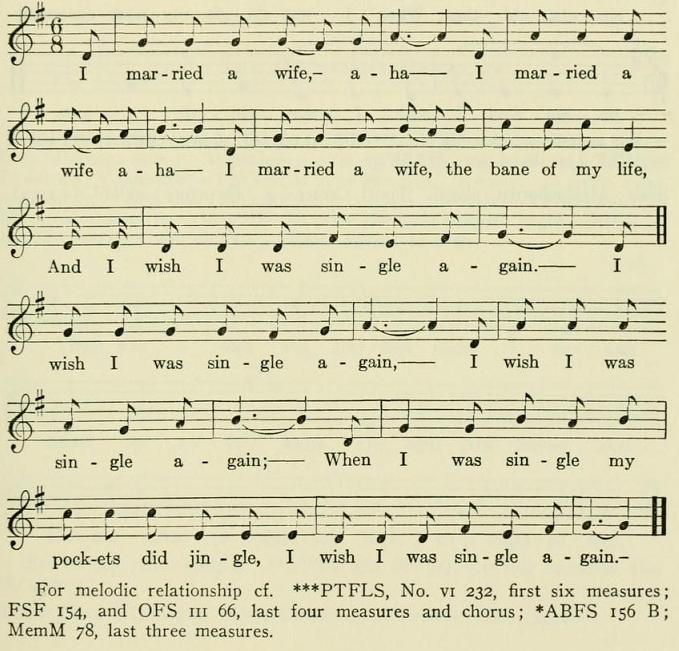
1. Oh! when I was single, oh! then,
Oh ! when I was single, oh ! then.
Oh! when I was single my pockets did jingle,
And I wish I was single again.
2. I married me a wife, she was the plague of my life.
And 1 wish I was single again.
3. My wife took sick, and she died pretty quick.
And I was glad I was single again.
Sometimes this third stanza is followed by this:
My wife she got worse, and I sent for a hearse
In hopes I'd be single again.
And sometimes stanza 3 takes this form:
My wife she died and I laughed till I cried.
So glad I was single again.
4. I married me another, she was the devil's grandmother.
And I wished I was single again.
Instead of this last stanza the following is sometimes sung:
I married me another, she was worse than the other,
And I wish I was single again.
B. 'I Wish I Was Single Again.' From J. W. Miller, student at Trinity College in 1934, from Lincoln county. This text lacks the opening stanza and is more detailed than A about what followed.
1. When my wife died, oh then,
When my wife died, oh then.
When my wife died I laughed till I cried
To think I was single again.
2. I went after her coffin, just laughing and talking
To think I was single again.
3. I went after her shroud, walking mighty proud,
To think I was single again.
4. I went to her grave, but I couldn't behave,
For to think I was single again.
5. I married another, but she was worse than the other;
Oh, I wish I was single again.
6 She beat me, she banged me, she swore she would hang me,
Oh, I wish I was single again.
C. 'When I Was Single.' From Miss Madge T. Nichols, Durham county, in 1922. Only two stanzas, "I married a wife" and "I married another," and the "When I was single" chorus.
D. 'I Wish I Was Single Again.' From Bessie Lou Mull, Shelby, Cleveland county. This is one of the texts that seem to depart from the normal verse form, stanza 2 being written :
My wife she died, oh then.
My wife she died, oh then.
And I laughed until I cried,
And I wish I was single again.
But the first and the last of the six stanzas are in the regular 3-3-4-3 rhythm so that one suspects that the other stanzas are miswritten. Stanza 1 is "I wish I was single again,' 'in stanza 3 he goes for her coffin, in stanza 4 he marries another, stanza 5 tells how the second wife beat and banged him; the final stanza is stall-ballad moralizing:
So, boys, take warning from this,
So, boys, take warning from this;
Be kind to the lirst. for the last is the worse;
And I wish I was single again.
E. "I Wish I Was Single Again." From Ailie Ann Pearce, Colerain, Bertie county. Text as in D.
F. "When I Was Single.' From Lucille Massey, Durham. Anotlier text which seems to deny the 3-3-4-3 stanza structure. Four stanzas : "When I was single," "I got me a wife," "My wife she died," and "I went for the cofiin."
G. 'I Wish I Was Single Again.' From Marguerite Riggs, Pitt county. Three stanzas: "I wish I was single," "I married a wife," and "I married another." Regular verse form.
H. 'Song.' From Mrs. Nilla Lancaster, Wayne county. Tliree stanzas, in the regular verse form : "I wish I was single again," "I married me a wife, oh then," and "My wife she died, oh then.''
I. "1 Wish I Was Single Again.' From Miss Jewell Robbins, Pekin, Montgomery county, in 1922. With the tune. Tliis siiows a slight variation in the refrain:
1. I married a wife, aha
I married a wife, aha
I married a wife, the bane of my life,
And I wish I was single again.
Chorus: Then I wish I was single again,
And I wish I was single again;
If I was single my pockets would jingle,
And I wish I was single again.
2. I married another, aha
I married another, aha
I married another, the devil's stepmother,
And I wish I was single again.
J. 'When I Was Single.' From J. C. Knox, Leland, Brunswick county. With the tune. Five stanzas, the first four of which correspond to the first four of A and the fifth to stanza 6 of B. The following report but a single stanza, "I wish I was single," etc.
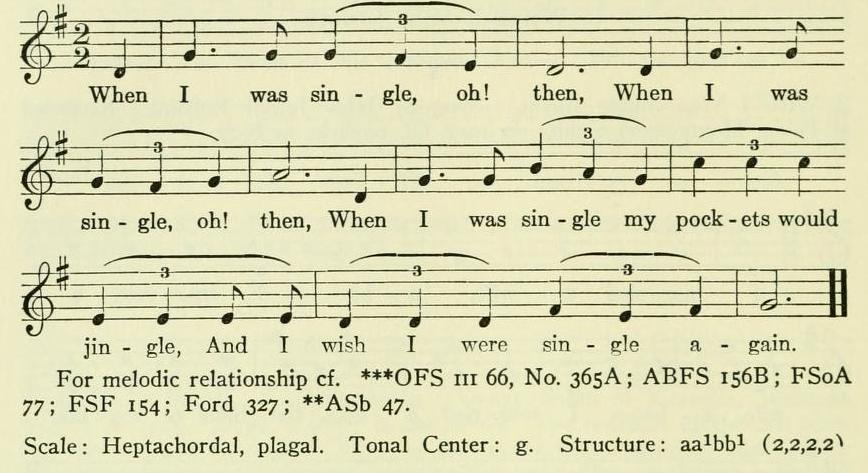
K. From Gertrude Allen (Mrs. Vaught ), Taylorsville, Alexander county.
L. From Ethel Hicks Buffalo, Oxford, Granville county.
M. From Louise F. Watkms, Goldsboro, Wayne county.
N. From Caroline Biggers, Union county.
O. From Katherine Bernard Jones, Raleigh.
P. From Louise Bennett, Middleboro, Wayne county.
Q. From Lucille Cheek, Chatham county.